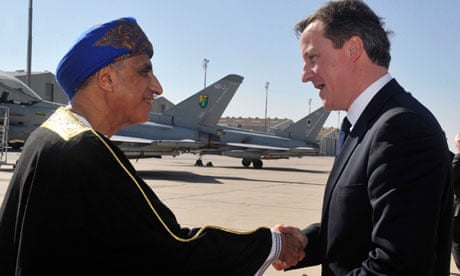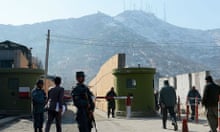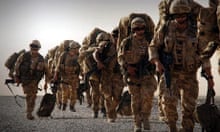Britain could deploy more troops to the Gulf in the coming years as it reduces its combat commitment in Afghanistan, the prime minister has said before a visit to Oman.
David Cameron expects to seal a £2.5bn deal with the Omani government for 12 Typhoon fighter jets, the latest sales of a plane the prime minister said he was "very keen" to promote. The government hopes to secure sales of 100 aircraft to the Gulf next year.
Cameron's visit to Muscat comes weeks after an agreement to set up a defence partnership with the United Arab Emirates, potentially focused on the Typhoon jet, made by BAE Systems. The Emirati government expressed interest in ordering up to 60 of the aircraft, Reuters reported.
"What you are seeing specifically with the United Arab Emirates is not just a plan to sell Typhoon aircraft, but a big, significant defence co-operation, which could lead to more British troops stationed in their country," he told journalists at Camp Bastion in southern Afghanistan.
"This is an exciting possibility for both countries to have a proper strategic defence relationship, a defence partnership, and I think that's the way the world is going. People don't just want to just buy equipment now, they want to have a proper industrial and defence partnerships." Britain has a small military presence in Bahrain, Qatar and the Emirates, Cameron added.
His statement ties in with a vision laid out last week by Britain's top military officer for the country's defence in coming decades, which includes drones and closer alliances in troubled areas as cuts shrink armed forces.
General Sir David Richards signalled a major military presence in the Gulf, saying he envisaged the army bonding further with militaries there and in Jordan. Two or more of the army's seven "adaptable" brigades could form "close tactical-level relationships" in the region.
Days after saying Britain would bring home nearly 4,000 troops from Afghanistan next year, Cameron added that the withdrawal could be speeded up before a 2014 deadline for the departure of all combat forces if the Afghan police and army were ready.
"I would make the point that so far things have surprised on the upside in terms of the capabilities of the Afghan national forces, so it may well be that we may be able to move a little faster," Cameron said after meeting troops for carols and table football as well as security briefings.
"The 2014 deadline doesn't change, what is obviously moveable is how the transition goes ... there is flexibility because all the time commanders are seeing how fast Afghan forces can take over particular patrol bases, particular roles."
Cameron said there had been little progress on peace negotiations with the Taliban, but Britain would be focused on bringing the uneasy neighbours Pakistan and Afghanistan together, and would host a meeting with their presidents early in 2013.
"I think the biggest role the UK government can play there ... is working to enhance relations between Afghanistan and Pakistan, and working to encourage the maximum amount of reconciliation, because we need a political track as well as a military track," he said.



